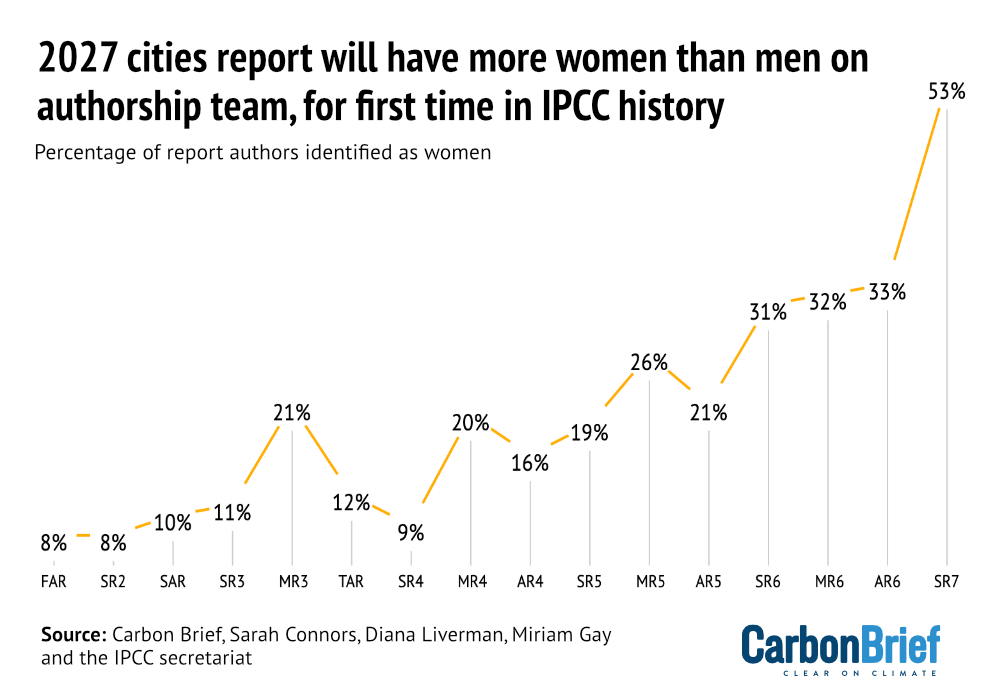
DeBriefed 21 February 2025: Brazil joins oil bloc ahead of COP30; US ‘pulled’ from IPCC meeting; Cooling cities with ‘smart’ surfaces
Robert McSweeney
02.21.25Robert McSweeney
21.02.2025 | 3:01pmWelcome to Carbon Brief’s DeBriefed.
An essential guide to the week’s key developments relating to climate change.
This week
Brazil’s oil ‘evolution’
OIL BE FRIENDS: Brazil’s government has approved an invitation to join OPEC+, a group representing the interests of oil-exporting nations, just months ahead of hosting the COP30 climate summit, the Associated Press reported. The move signals the “country’s evolution into a major oil state”, the newswire said. Brazil’s energy minister said the country’s participation will be limited to a “forum for discussing strategies” and that “we should not be ashamed of being oil producers”.
SHIPPING SHOWDOWN: Brazil was also among 15 countries that asked the UN to ditch plans for a new levy on CO2 emissions from global shipping, reported the Guardian. Ahead of an International Maritime Organisation (IMO) meeting this week, the group – which includes China, Saudi Arabia and South Africa – “argued a levy could reduce exports from the developing world, raise food prices and increase inequalities”, the newspaper said. It added that the levy “could still pass”, if the IMO takes a “firm stance”.
NO HOTEL, NO PROBLEM: During a visit to Belém, the host city for COP30 this November, Brazilian president Luiz Inácio Lula da Silva responded to concerns that it does not have enough accommodation by saying delegates could “sleep [under the] star[s] in the sky…which will be wonderful”, Folha de São Paulo reported. And Reuters covered the latest raids as part of “Operation Maravalha” to curb illegal logging in the Amazon.
Trampling Trump
ACCESS DENIED: US state department officials have been denied permission to participate in an Intergovernmental Panel on Climate Change (IPCC) meeting in China next week, Axios reported. A contract for an IPCC working group technical support unit was also “recently terminated by NASA”, it added. Axios also reported that NASA and NOAA (the National Oceanic and Atmospheric Administration) are in line for a “10% reduction in staff”, which could “imperil” the work of the National Weather Service.
‘CHAOTIC’: In US president Donald Trump’s latest move to dismantle federal climate policies, the Department of Homeland Security has been ordered to “eliminate all climate change activities and the use of climate change terminology”, Bloomberg reported. This includes the Federal Emergency Management Agency, which “has been responding to more disasters”, the newswire added, as “wildfires, storms and floods increase”.
‘LIQUID GOLD’: Trump has signed an executive order formally creating a “National Energy Dominance Council”, reported the Associated Press, and “directed it to drive up already record-setting domestic oil and gas production”. Trump said: “We’re going to make more money than anybody’s ever made with energy.” E&E News examined how his ambitions could hit “economic and geologic realities”.
Around the world
- ABOUT TURN: In a “major policy shift”, Japan’s newly approved energy plan will aim to produce 20% of its electricity from nuclear power by 2040, reported BBC News.
- RISING SEAS: The Pacific Ocean nation of Nauru is aiming to sell citizenships to help meet the cost of moving 10,000 residents from low-lying areas into the island’s “barren interior”, Bloomberg reported.
- LANDSLIDE RISK: Heavy rainfall in Peru has killed at least 46 people and left more than 8,000 people homeless, reported El Comercio, which noted that the extreme weather was expected to continue in the coming days.
- ‘GREEN CORRIDOR’: Environmentalists warned that a new protected area – the size of France – in the Democratic Republic of Congo has so far failed to include Indigenous people and local communities in its design, Climate Home News said.
- ICE IN DECLINE: According to BBC News analysis of satellite data, global sea ice extent dropped to a record low in mid-February.
- ‘FRAGILE GLOBAL EXISTENCE’: A G20 meeting of foreign ministers has started in Johannesburg, South Africa, with “stepping up the fight against global warming” on the agenda, reported Bloomberg. US secretary of state Marco Rubio has “snubbed” the event due, in part, to its climate focus, it added.
10%
The record proportion of China’s GDP coming from clean-energy technologies in 2024, according to analysis published by Carbon Brief.
Latest climate research
- Glaciers across the world collectively lost 273bn tonnes of ice every year between 2000 and 2023, a new Nature study found, with a 36% increase in ice loss from the first (2000-11) to the second (2012-23) half of the research period.
- New research in a Royal Society journal used data collected from 600 green turtles over three decades to show that females are bringing forward their nesting dates by six days for every 1C of sea surface temperature rise.
- The timing of plant flowering and insect flight in the US is “highly responsive” to extreme weather events, a Nature Climate Change study showed.
(For more, see Carbon Brief’s in-depth daily summaries of the top climate news stories on Monday, Tuesday, Wednesday, Thursday and Friday.)
Captured

The Intergovernmental Panel on Climate Change’s (IPCC) forthcoming special report on climate change and cities has more women than men on its authorship team, for the first time in the organisation’s history, according to analysis by Carbon Brief. The analysis covers all assessment, special and methodology reports published over the IPCC’s 37-year history. It revealed how the representation of women in the IPCC has steadily risen over time, from just 8% of authors in its first report in 1990 to 53% in its cities report, due to be published in March 2027.
Spotlight
Cooling cities with ‘smart’ surfaces
Carbon Brief reports on how “smart” surfaces can be used to cool cities in the face of worsening extreme heat.
Last month, new research showed that increasing the reflectivity of surfaces at San Francisco International airport could cut the risk of heat stress in its outdoor workers and see fewer working hours lost at the height of summer.
At its heart, the idea is a simple one – making the ground surface and roofs of buildings more reflective means they absorb less of the sun’s energy. This, in turn, means they warm up less and radiate less heat back into the surroundings.
This helps offset the “urban heat island” effect, where temperatures in cities are consistently higher than in the surrounding countryside due to heat-trapping urban infrastructure.
Heat inequality
The airport study was conducted by the Smart Surfaces Coalition, a not-for-profit organisation that works with cities to use “smart” surfaces – including reflective, porous and green surfaces, solar panels and urban trees – to help manage the impacts of extreme heat and rainfall.
The coalition is working with 11 “partner cities” in the US – plus Bhopal in India – to drive adoption of smart surfaces through citywide policies and local implementation projects.
According to coalition founder Greg Kats, cities have typically followed “business as usual” for public construction projects – opting for “dark, impervious surfaces of tarmac” at the lowest cost, which “absorbs 90% of the incoming sunlight”.
As well as leaving cities at higher risk of getting “hotter and hotter and more prone to flooding”, these choices have contributed to urban inequality, Kats explained to Carbon Brief.
In the case of Baltimore on the US east coast, “at the same time of day in the summer afternoon” there will be a “14F [7.8C] temperature difference between wealthy, treed areas and low-income, dark, impervious areas”, he said.
This “structural inequality is a legacy of redlining” – long-abolished discriminatory lending practices in the US – and is a “hallmark of American cities”, Kats added.
Urban cooling
In partner cities, the coalition is conducting citywide surface mapping and heat modelling, developing cost-benefit tools and helping cities craft policies and building codes.
In Baltimore, for example, installing smart surfaces could bring more than 5F (2.8C) of citywide cooling, coalition analysis has shown, with benefits that outweigh the costs at a ratio of 10 to 1.
These measures also reduce the need for air conditioning, Kats explained:
“For 1F of ambient temperature reduction, it reduces an air conditioning electricity bill by 4-5%, so a 5F reduction is a 20-25% reduction in electricity bills.”
As a result, smart surfaces are a “really big deal” for climate mitigation, Kats said. And it taps into another aspect of the urban island effect – a key contribution comes from human activity, such as the use of cars and air conditioning.
Air conditioners cool the air inside buildings by pumping waste heat outside, so “you have this perverse effect of private cooling heating the city, which means more air conditioning”. Kats explained:
“So you’ve got two different pathways for a city: do you do citywide cooling, or do you keep relying on the private sector to buy more air conditioning?”
While cool surfaces do have their barriers and challenges, Kats argued that they offer the “only viable, scalable, cost-effective, urban-cooling strategy”, adding: “There really isn’t anything else.”
Watch, read, listen
‘TRAPPED IN EXPLOITATION’: Climate Home News reported on how “nearly all” Bangladeshi migrants who leave areas hit hard by climate change to seek work elsewhere end up “subject to forms of forced labour”.
RECORDS SMASHED: A Guardian interactive mapped the record heat experienced by two-thirds of the Earth’s surface in 2024.
PRESERVING WEBSITES: A research librarian and policy scholar in North America outlined in the Conversation how to “find climate data and science the Trump administration doesn’t want you to see”.
Coming up
- 23 February: Germany general election
- 24-28 February: 62nd session of the Intergovernmental Panel on Climate Change, Hangzhou, China
- 25-27 February: Resumed session of the UN biodiversity summit COP16, Rome
- 26 February: UK Climate Change Committee seventh carbon budget advice published
- 26-28 February: Finance in common summit, Cape Town, South Africa
Pick of the jobs
- The China Global South Company, critical minerals editor | Salary: Unknown. Location: Remote (Africa preferred)
- Dioceses of Leicester and Peterborough, net-zero carbon projects development officer | Salary: £30,000. Location: Peterborough, Leicester or Northampton, UK
- Imperial War Museum, head of sustainability and environment | Salary: £65,000. Location: Duxford, London or Manchester, UK
- Groundwork, goals for climate co-ordinator | Salary: £24,716. Location: Hybrid (Northern Ireland)
- Energy and Climate Intelligence Unit, consultant analyst – trade and net-zero | Salary: Unknown. Location: Flexible
DeBriefed is edited by Daisy Dunne. Please send any tips or feedback to [email protected].
This is an online version of Carbon Brief’s weekly DeBriefed email newsletter. Subscribe for free here.
-
DeBriefed 21 February 2025: Brazil joins oil bloc ahead of COP30; US ‘pulled’ from IPCC meeting; Cooling cities with ‘smart’ surfaces



